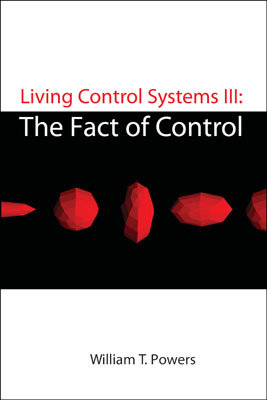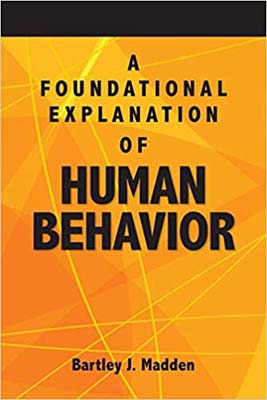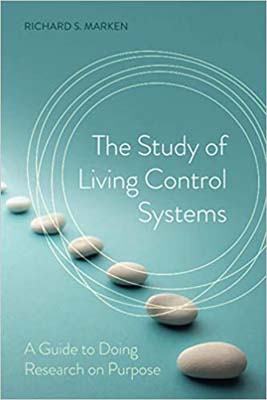Books by other publishers
For most complete info, see PCT: A Book of Readings and resources, just below |
|
|
|
|
PCT: A Book of Readings
An Overview of the Third Grand Theory in Psychology
Introductions, Readings, and Resources
This book by Living Control Systems Publishing features 34 papers with selections from 26 books, most with a complete sample chapter.
That means that this Book of Readings is more complete than this web page. |
Book detail
Download
|
|
|
|
|
Living Control
Systems IV
The Interdisciplinary Handbook of Perceptual Control Theory brings together the latest research, theory, and applications from W. T. Powers’ Perceptual Control Theory (PCT) that proposes that the behavior of a living organism lies in the control of perceived aspects of both itself and its environment. Sections cover theory, the application of PCT to a broad range of disciplines, why perceptual control is fundamental to understanding human nature, a new way to do research on brain processes and behavior, how the role of natural selection in behavior can be demystified, how engineers can emulate human purposeful behavior in robots, and much more.
Ed: Warren Mansell, Academic Press 2020, ISBN 978-0128189481 |
Book detail
Download
|
|
|
|
|
Behavior:
The Control of Perception
“Powers’
manuscript, Behavior: The Control of Perception, is among the most
exciting I have read in some time. The problems are of vast importance,
and not only to psychologists; the achieved synthesis is thoroughly
original; and the presentation is often convincing and almost invariably
suggestive. I shall be watching with interest what happens to research
in the directions to which Powers points.” —Thomas S.
Kuhn
“Here is a
profound and original book with which every psychologist—indeed
every behavioral scientist—should be acquainted. It is delightful
to have a person of such varied and unorthodox background come forth
with a unique theory of the way in which behavior is controlled
in and by the individual, a theory which should spark a great deal
of significant research.”—Carl R. Rogers
© 2005 Benchmark Publications Inc. 332 pages, 6x9 inches, illustrated, paperback, Benchmark Publications, Montclair, NJ. ISBN 0-9647121-7-2 |
Book detail
About Bill Powers
Download
|
|
|
|
 |
Living Control
Systems III
— The Fact of Control
"Living Control Systems III continues Powers' revolutionary approach to understanding living organisms as purposeful agents whose actions serve to control their environments. A unique feature of the book is the accompanying computer programs where Powers `puts his models where his mouth is,' graphically demonstrating how negative feedback control systems can account for a wide range of goal-oriented behavior. This book is required reading (and computing) for anyone seeking a deep understanding of the behavior of living organisms."
— Gary Cziko, Professor Emeritus, University of Illinois
© 2008 Benchmark Publications Inc. 214
pages, 6 x 9 inches, Paperback, Benchmark Publications, NJ. ISBN 978-0-9647121-8-8 |
Book detail
About Bill Powers
Download

|
|
|
|
 |
Purpose, Meaning, and Action:
Control Systems Theories in Sociology
Control Systems Theory, a newly developing theoretical perspective, starts from an important insight into human behaviour: that people attempt to control the world around them as they perceive it. This book brings together for the first time the work of prominent sociologists contributing to the development of this wideranging theoretical paradigm.
Kent A McClelland and Thomas J. Fararo, editors
Palgrave Macmillan (2006). |
Download |
 |
A Foundational Explanation of
HUMAN BEHAVIOR
"The ideas in this book are the product of wide reading and research, deep curiosity, and reflective time. They need to be viewed and absorbed from different angles—economics, finance, psychology, entrepreneurship, and innovation.... [Madden's] books are generally aimed at a business audience, but they are “anti-disciplinary,” i.e. they don’t respect the normal boundaries of academic writing, and are all the more valuable for it. Madden has an eye for and is open to new thoughts by others, and chasing down some of his references is also highly rewarding.
— Jeff Ubois, VP, Knowledge Management, Lever for Change / MacArthur Foundation
© 2021 Bartley J. Madden. 70
pages, 6 x 9 inches, Paperback, Bartley J. Madden Foundation, Naples FL. ISBN 978-09885969-8-6 |
Book detail
Download
About Bart Madden
|
|
|
|
 |
The Study of Living Control Systems
This book is a guide to doing a new kind of psychological research that focuses on the purposes rather than the causes of behavior. The research methods described here are based on a theory of behaviour called Perceptual Control Theory (PCT).... According to PCT, purposeful behaviour involves acting to control perceptual input variables. Thus, understanding the purposeful behaviour of living organisms is a matter of determining the perceptual variables they are controlling when they are carrying out various behaviors. This book outlines research methods that determine what perceptual variables an organism is controlling, how it controls those variables, and why.
© 2021 Richard S. Marken. 154
pages, 6 x 9 inches, Paperback, Cambridge University Press, UK.ISBN 978-110870733-6 |
Book detail
About Rick Marken
Download
|
|
|
|
|
The
Wonder Weeks
Van de Rijt and Plooij's work on infant development has enormous value for clinical use and scientific application. Not only have they explained the periods of puzzling, difficult behavior in infancy which so worry parents, they have also shown how these behaviors mark developmental leaps and have described the stages in the infant's understanding. Together, this gives parents and professionals soundly based insight into babies' developing minds.....
—John Richer, Ph.D., Dip. Psych., John Radcliffe Hospital, Oxford
By
Hetty van de Rijt, Ph.D. and Frans Plooij, Ph.D (2010). 510 pages,
6.7x9.6 inches, illustrated, paperback. Kiddy World Promotions B.V., The Netherlands. ISBN 978–90–79208–04–3. |
Book detail
About Frans Plooij
|
|
|
|
|
|
Making Sense of Behavior
— The Meaning of Control
For almost a century, it has been the custom among American psychologists to seek to understand human nature by watching what people do. Most books about human nature focus on human doings; they focus on nameable acts with beginnings and endings. Consider a television set. What does a TV do? It shows us moving pictures on its screen; that is the "behavior" we see. But we could spend an entire lifetime studying the action on the screen and never come to understand a thing about how a TV functions. This book does not focus on visible acts. It focuses on perception. It shows us how action comes about if and only if we find a discrepancy between what we are experiencing and what we want to experience. — Philip J. Runkel.
©
1998-2004 Benchmark Publications Inc. 180 pages, 5.5x8.5" , Paperback, Benchmark Publications, NJ. ISBN 0-9647121-5-6 |
Book detail
Download
About Bill Powers

|
|
|
|
|
|
Living Control
Systems I
14 previously published papers, 1960-1988.
The
control theory viewpoint has gained many supporters in recent
years because of its rigor, its beauty, and its explanatory abilities.
This viewpoint was first developed by William T. Powers in the
papers in this book.
©
1989 William T. Powers 295
pages, 5.5x8.5 inches, paperback, Benchmark Publications, New Caanan,
CT. ISBN 0-9647121-3-X |
Book detail
About Bill Powers
Download

|
|
|
|
|
|
Living Control
Systems II
22
Previously unpublished papers, 1959-1990.
Powers
critiques the theories of mainstream behavioral scientists, showing
how their defects are avoided by applying control theory instead.
He also demonstrates the need for truly generative models if a
genuine science of living control systems is to be developed.
©
1992 William T. Powers 275 pages, 5.5x8.5 inches,
paperback, Benchmark Publications, Montclair, NJ. ISBN 0-9647121-4-8 |
Book detail
About Bill Powers
Download

|
|
|
|
|
A People Primer:
The Nature of Living Systems
“What a blast of a book! Shelley Roy obviously has a deep and clear understanding of Perceptual Control Theory, and her style of presentation shows respect for the intelligence of the reader while at the same time making sure that her message gets across. Shelley successfully suppresses the writer’s ego and never condescends — a very nice combination.” William T. Powers
©
2008 Shelley A.W. Roy. 231 pages, 6 x 9 inches, paperback.
Published by New View Publications, N.C. ISBN 0-944337-47-3 |
Book detail
|
|
|
|
|
|
Introduction
to Modern Psychology
The Control-Theory View
Suitable
as the primary text for introductory college-level psychology courses
and for independent study, this textbook provides a unified approach
to the entire field of psychology, from laboratory studies of animal
behavior, through ethology and studies of human social behavior,
to clinical work.
©
1990 Richard J. Robertson and William
T. Powers. 220
pages, References & Index, 8.5x11 inches, illustrated, paperback,
Benchmark Publications, Montclair, NJ. ISBN 0-9647121-6-4 |
Book detail
Download
About Bill Powers
About Dick Robertson

|
|
|
|
|
|
Mind
Readings
Experimental Studies of Purpose
This
is a book that can show a willing psychologist how to do a new kind
of research. The theme that runs through all these papers is modeling,
the ultimate way of finding out what a theory really means. Richard
Marken is a skilled modeler, as will be seen. But he has a talent
that goes beyond putting ideas into the form of working simulations,
a talent that can be admired but is hard to imitate. He finds the
essence of a problem and an elegantly simple way to cast it in the
form of a demonstration or an experiment. — William T.
Powers.
©
1992 Richard S. Marken, 222 pages, 5.5x8.5 inches, illustrated,
paperback, Benchmark Publications, Montclair, NJ. ISBN 0-9624154-3-X |
Book detail
About Rick Marken

|
|
|
|
|
|
More
Mind Readings
This book expands on Marken's first book, Mind Readings, by venturing further into speculative modeling and even criticism, both ventures being successful and thought-provoking. His great talent for organizing complex subjects into comprehensible models—and then showing that the models actually work—is evident and as satisfying as it was in the first volume. Despite its being far ahead of its time, this book is essential reading for anyone who wants to know where psychology is, or should be, headed.
William T. Powers, author Behavior: The Control of Perception
©
2002 Richard S.
Marken, 210 pages, 5.5x8.5
inches, illustrated, paperback, new view, St. Louis, MO. title page
says ISBN 0-9704701-7-7, cover
says ISBN 0-944337-43-0 |
Book detail
Download
About Rick Marken

|
|
|
|
|
Without Miracles
Universal Selection Theory and the Second Darwinian Revolution
The remarkable achievements that modern science has made in physics, chemistry, biology, medicine, and engineering contrast sharply with our limited knowledge of the human mind and behavior. A major reason for this slow progress, claims Gary Cziko, is that with few exceptions, behavioral and cognitive scientists continue to apply a Newtonian-inspired view of animate behavior as an organism's output determined by environmental input. This one-way cause-effect approach ignores the important findings of two major nineteenth-century biologists, French physiologist Claude Bernard and English naturalist Charles Darwin.
©
1995 Gary A. Cziko, MIT press ISBN 978-0262032322. |
Download Chapters
Download SinglePDF
Book detail

|
|
|
|
|
The Things We Do
Using the Lessons of Bernard and Darwin to Understand the What, How, and Why of Our Behavior
The remarkable achievements that modern science has made in physics, chemistry, biology, medicine, and engineering contrast sharply with our limited knowledge of the human mind and behavior. A major reason for this slow progress, claims Gary Cziko, is that with few exceptions, behavioral and cognitive scientists continue to apply a Newtonian-inspired view of animate behavior as an organism's output determined by environmental input. This one-way cause-effect approach ignores the important findings of two major nineteenth-century biologists, French physiologist Claude Bernard and English naturalist Charles Darwins
©
2000 Gary A. Cziko, MIT press ISBN 978-0262032-77-3. |
Download Chapters
Download SinglePDF
Book detail
|
|
|
|
|
Hold That Thought
The Method of Levels (MOL) is an application of the principles of Perceptual Control Theory (PCT). Advanced by William T. Powers in his seminal book, Behavior: The Control of Perception, this scientific model explains how all living organisms are constantly acting to control their perceptions rather than reacting to environmental conditions. Powers suggests that living things are organized as feedback systems, comparing information obtained through their senses (perceptual system) with internal references (wants, goals, and intentions), acting on the environment to obtain a match. The model has important implications for neuroscience and psychology and related fields such as counseling, psycholtherapy and education.
© Timothy a Carey, Newview 2008 ISBN: 0-944337-49-X |
Book detail
Download
About Tim Carey
|
|
|
|
|
Principles-based Counselling and Psychotherapy
A Method Of Levels Approach
Many current approaches to the treatment of psychological problems focus on specific disorders and techniques that are purported to be effective and distinct. Recent advances in knowledge and theory, however, have called into question this approach. The conceptual framework of transdiagnostic, rather than disorder specific, processes is gaining traction. Alongside this has been the call to focus on evidence-based principles rather than evidence-based practices and techniques. The rationale behind this is that many apparently unique and innovative practices are usually the reflection of common underlying principles. This book describes three foundational principles that are key to understanding both the rise and the resolution of psychological distresss
© Timothy A. Carey, Warren Mansell, Sara J. Tai
Routledge 2015, ISBN 978-0415738781 |
Book detail
Download
About Tim Carey
|
|
|
|
|
Controlling PEOPLE
The Paradoxical Nature of Being Human
“We need to strive for a world where people control what is important to themselves while minimizing the controlling of others.” We are all controlling people. In fact our feelings of wellbeing depend on staying in control. Just as when we drive a car, we must stay in control in everyday life in order to keep the things we care about going in the right direction. Yet this natural controlling behavior is sometimes the very reason we end up losing control. This happens when we try to control other people as well as when we try to control ourselves. So how do we do better? Based on Perceptual Control Theory (PCT), this entertaining and enlightening book by Richard S. Marken and Timothy A. Carey show that understanding PCT opens the window to understanding and learning about ourselves as controlling people and equips us to lead more effective and satisfying livess
©
2015, Richard S. Marken, Timothy A. Carey
Australian Academic Press ISBN-13: 978-1922117649 |
Book detail
Download
About Tim Carey
About Rick Marken
|
|
|
|
|
|
Freedom From Stress
Ed's
aim in this book is first to teach control theory in terms that
are relevant to ordinary life and the problems of real people
who aren't theoreticians. In this book he slants the message toward
the specific problem of stress: what it is and what people can
do to free themselves of this difficulty. He is convinced, and
I agree, that the basic task is to understand what is going on,
not to prescribe some pill or procedure that will work like a
cold remedy. Out of understanding will come awareness of what
has to change. And then the change will come about naturally.
—William T. Powers
©
1989, 1993 Edward E. Ford, 220 pages, 5.5x8.5
inches, illustrated, paperback, Brandt publishing, Scottsdale,
AZ. ISBN 0-9616716-1-0 |
Book detail
Download
About Ed Ford
|
|
|
|
|

